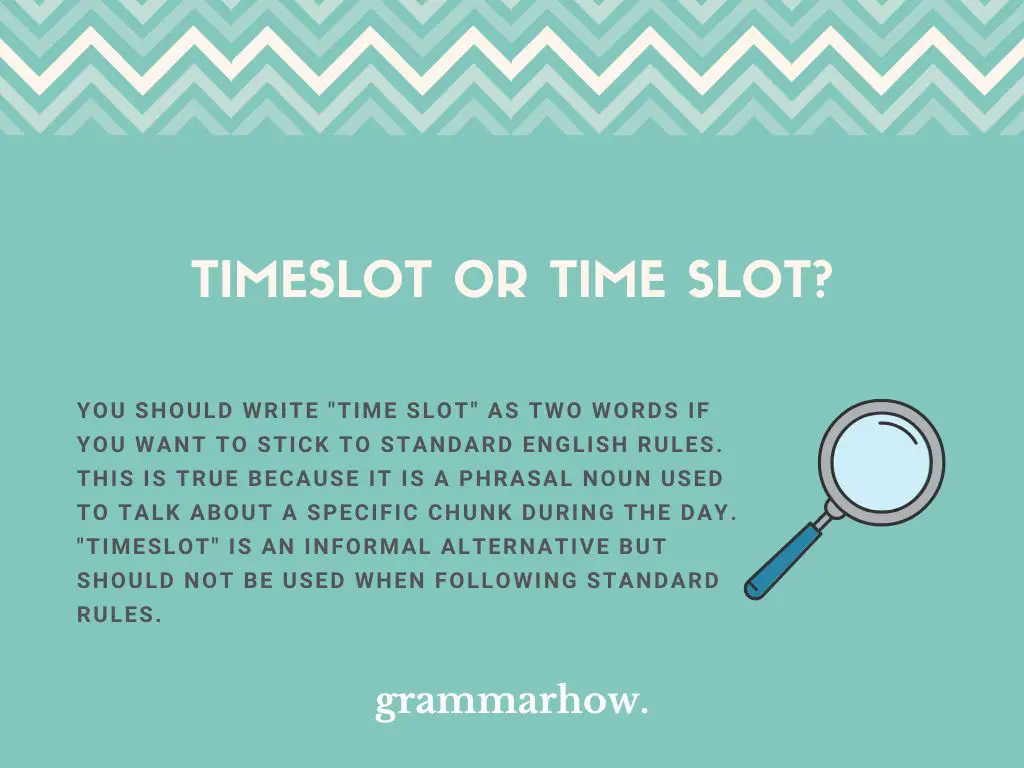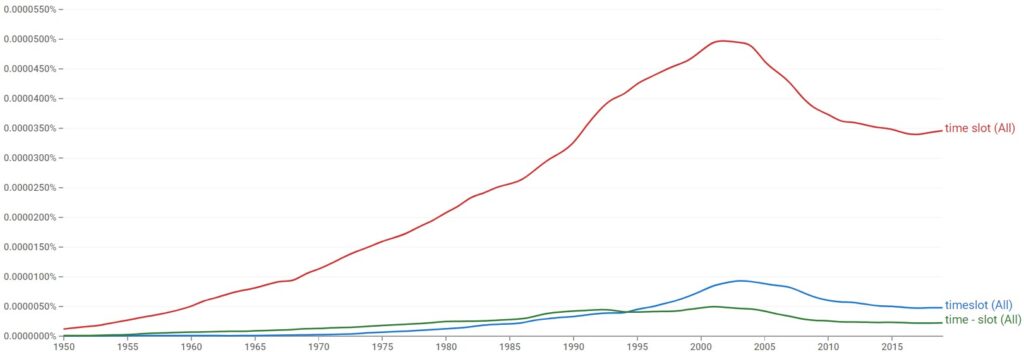“Time slot” seems to have multiple forms associated with it. This article will explore whether it’s one or two words. We’ll also look into the hyphenated form to find out which is most appropriate for your writing.
Timeslot or Time slot?
You should write “time slot” as two words if you want to stick to standard English rules. This is true because it is a phrasal noun used to talk about a specific chunk during the day. “Timeslot” is an informal alternative but should not be used when following standard rules.

According to Google Ngram Viewer, “time slot” should always be written as two words. This is made clear by the huge difference in popularity amongst English writers according to the trend lines.

Both the one-word option and the hyphenated options are rarely used. The one-word option is a common alternative, though it’s best to avoid it in formal writing when you need to follow grammatical rules.
It might help to refer to official UK and US dictionaries such as The Cambridge Dictionary and The Oxford Dictionary. Both dictionaries provide entries for “time slot” as two words.
Neither dictionary includes an entry for either “timeslot” or “time-slot,” showing they are not grammatically correct.
Is “Timeslot” One Word?
“Timeslot” is not grammatically correct as one word, though it is sometimes used informally. It’s best to avoid it in your writing to show that you have a firm understanding of English rules and the official spelling of “time slot.”
You should keep the words separated to ensure they modify the sentence correctly. Grouping the word is common for native speakers (so don’t feel too bad if you do it yourself), though no official dictionaries seem to recognize “timeslot” as one word.
These examples will show you how to use the appropriate form of “time slot:”
- Correct: I don’t know what the available time slots are, but I can take a look and get back to you when I know more.
- Incorrect: I haven’t looked at the timeslots yet because I’ve been a bit busy. I’ll see if there’s anything I can do to help you, though.
- Correct: Time slots are available all over the place. You just have to pick one that works best for you, honey.
- Incorrect: I don’t know the timeslot for the meeting yet. I’m not sure they’ll be able to tell it to me, either.
“Timeslot” is a more straightforward form of “time slot,” though. Simplistic language choices often have a habit of becoming more popular as English evolves. You may one day find that “timeslot” becomes just as popular (if not more so) than “time slot.”
Here’s how it works informally:
- I will need to know the timeslot for the meeting on Tuesday. Can you sort that out for me?
- What’s the timeslot you’re referring to? Is it worth looking into other options?
Is “Time slot” Two Words?
“Time slot” is correct as two words, and you should always write it in this form. It is correct because you can use “time” as an adjective to modify “slot,” showing that you are allotting a chunk of time in a day.
It’s a great way to set up meetings or find out someone’s availability.
Any hyphenation or grouping of the words removes the original meaning behind “time slot.” It’s best to avoid doing this.
Here are a few examples to show you how to use “time slot” as two words:
- I’m not sure if I can make that time slot. I’m very busy on that day, so I’ll need to be advised of another time for the meeting.
- Which time slot is going to work best for you? We’re a bit behind schedule, so we can’t accommodate everyone.
- I’ll need to refer to my diary before agreeing to the time slot of 9 o’clock. It seems a bit too early, if I’m honest.
- How does that time slot sound to you? We want everyone to come along, so you need to be there to see it happen.
- There are a few too many time slots to choose from here. I hope you understand that I’ll need to double-check my options.
Is “Time-slot” Hyphenated?
You should not group “time-slot” with a hyphen. It’s incorrect to write it in this form because the two words should remain separated. You may refer to official style guides when you have questions about things like this.
AP Style would usually require you to hyphenate multiple words when they modify a noun. The noun should come directly after the hyphenated word to show that it has become a compound adjective.
However, “time” is meant to modify “slot” when written as “time slot.” Grouping the two words with a hyphen would remove this modification, meaning that “time-slot” would not mean the same as “time slot.”
These examples should help you to figure out the correct form without the hyphen:
- Correct: What are we going to do about the available time slots? We need to find a way to get everyone involved.
- Incorrect: These time-slots are no good. I’m afraid we’re going to have to scrap the whole thing and come up with something else.
- Correct: I’m going to look into the time slot at 8 o’clock. It should give me a better idea of what to do next.
- Incorrect: Your time-slots are all over the place. Why are you making it so difficult for us to sort this out?
Tip to Remember the Difference
Since “time slot” is correct as two words (for the time being), it would help to remember the difference.
“Time” modifies “slot” when used in this format. You must keep “time” separate from “slot” to show this modification and clarify that you’re referring to a slot of time during the day.
Final Thoughts
You should only ever write “time slot” as two words at the moment. It’s the only grammatically correct form that’s officially recognized. “Timeslot” seems to be growing as an informal form, and it could overtake “time slot” as the correct option one day. “Time-slot” never works.

Martin holds a Master’s degree in Finance and International Business. He has six years of experience in professional communication with clients, executives, and colleagues. Furthermore, he has teaching experience from Aarhus University. Martin has been featured as an expert in communication and teaching on Forbes and Shopify. Read more about Martin here.

